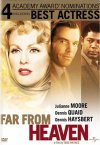BUY THE DVD:
|


|
|
|
SYNOPSIS:
| |
in 1950s connecticut, a housewife faces a marital crisis and mounting racial tensions in the outside world.
|
|
|
MOVIE FACT:
| |
this is the second teaming of julianne moore with writer/director todd haynes and producer christine vachon, following the film safe.
|
|
|
RATING:
|



three out of four possible stars
|
|
|
|
The story of Far From Heaven is deceptively simple. On the surface, it looks like no more than a loving tribute (or harsh criticism, depending on how you view it) of 1950's American cinema. Homage’s to the great melodramatic filmmakers of that era, like Douglas Sirk and his use of vivid, blue Technicolor, show up frequently in Heaven, but there is more substance to this film than just its look and feel. The relationships between the understated, yet tortured characters covers the subjects of racism and homosexuality (not as a single idea but as two different elements) that would have been horribly taboo if they had been placed into a film fifty years ago.
The three lead actors, Julianne Moore and Dennis Quaid, who play a married couple, and Dennis Haysbert, who plays their gardener, all give exacting, subtle performances that have just the right amount of intensity to keep the viewer glued to the screen. Although there are a few scenes where voices are raised and shouting occurs, so much of this film's emotional charge comes from the ability of each of these actors to communicate fully to the audience what their characters are thinking without there having to be dialogue to explain every soft nuance.
Julianne certainly deserves accolades for her performance in this film. Not only does she look and sound the part (the dialogue in this film is just so on target), but she "feels" it as well. Perhaps its the combination of her classic looks and a good hair-dresser, but she seems to have been plucked right out of 1955 and dropped into this movie. In point of fact, the dressings for all the actors in this film seem to have been meticulously chosen. And the way those bright, primary colors show up just scream Technicolor. There's no use in using Technicolor unless you're going to milk every ounce of bright color out of the rainbow for your actors to wear, right?
The cinematography of this film is one of its high points. And though this film has a lot of positives, the director of photography really made a wonderful effort in creating the beautiful yet repressed atmosphere of 1950's Connecticut. Sweeping camera shots detailing rows of autumnal leaves in their brightest colors bring a lot of scope to the film. And the editing works hand in hand with the direction the cinematographer took with his filming. Cut together as if it was actually made in the fifties, the editing goes so far as to imitate the way actors were shown on screen back then. For example, how an actor would turn away from whomever they were talking to and the shot would immediately cut to a shot of that actor from the other direction, with the person they turned from in the background.
This type of composition almost speaks of melodrama, but the issues dealt with in this film are anything but melodramatic. It is a much more standard type of drama, leaving any sort of female weakness at the door. Though she is pushed into a corner by the reservations and traditions of her world, Julianne's character is nothing like the submissive woman that an actual fifties melodrama might make her out to be. She is a strong woman with an intelligent head on her shoulders and if the film resembles modern filmmaking in any way, it is in the way that character deals with her problems.
An additional element of this film that seems to jump right out of the 1950's, is the score. It is large sweeping and probably the only truly melodramatic element of the film. As it plays over the opening credits, it almost resembles the overture of a classic film where the composer would include elements from all the various themes in the movie (themes usually assigned to specific characters) in that two and a half minute long span of music. The lush orchestral nature of the score makes sure that it is always a strong element of the film. In fact, it might be the only thing about the film that trips up the natural flow of the story.
For example, at the end of the film, there is a camera move that backs away from the last scene slowly, and the score rises to a climax a bit too loudly and a bit too soon. But since the filmmakers were going for truth in their 1950's tribute, the score is more true to the era than appropriate for modern dramatic storytelling. The music may overwhelm some audience members, as it becomes quite loud in some scenes, but with the attention to detail paid to the costumes and dialogue, the ostentatious score is usually not out of place.
And speaking of dialogue, the speech of the characters is one of the most humorous (and there is humor in this film) elements of the movie. At one point, Julianne's character, "Cathy Whitaker," admonishes her son on the use of the word "jeez." Although this is hardly the offensive word in the twenty-first century, the fact that she tells him that "language like that is not used in this home" gives the audience a good chuckle. The fact that this film has stellar performances, beautiful cinematography, and affecting story, and still makes room for some humor, is just another piece of evidence showing Far From Heaven to be an extremely enjoyable and well made film.
Review by Kelsey Wyatt.
| |
|